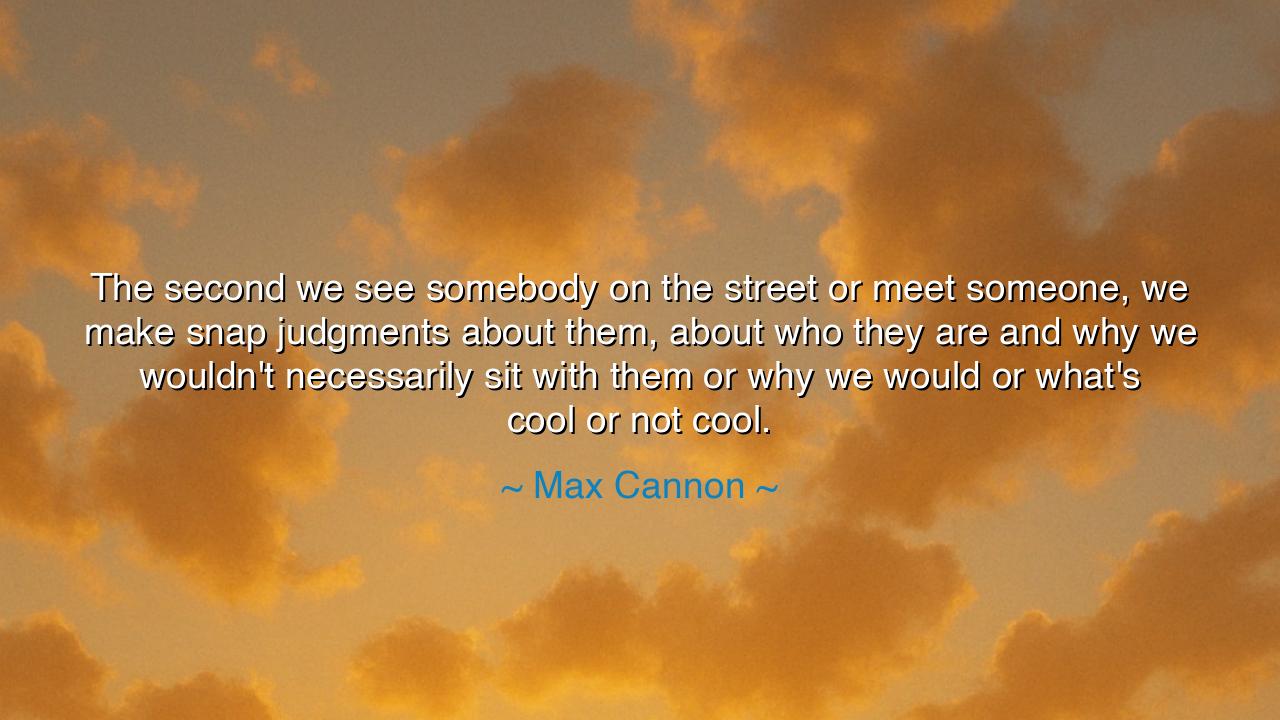
The second we see somebody on the street or meet someone, we make
The second we see somebody on the street or meet someone, we make snap judgments about them, about who they are and why we wouldn't necessarily sit with them or why we would or what's cool or not cool.






In the fleeting moments when we cross paths with another soul, there is a profound truth hidden within the instinctive judgments we make. Max Cannon speaks to this truth when he says, "The second we see somebody on the street or meet someone, we make snap judgments about them, about who they are and why we wouldn't necessarily sit with them or why we would or what's cool or not cool." These words hold a mirror up to our nature, revealing how quickly we assess those around us, often without even realizing it. In these brief encounters, we project our own values, biases, and insecurities, casting judgments that are as immediate as they are shallow.
The ancients understood that judgment is not only a natural part of human interaction but also a double-edged sword. In ancient Greece, Socrates warned that judgment, when based purely on external appearances, can be a source of great misunderstanding. He taught that true knowledge and wisdom come from understanding the inner nature of a person, not from fleeting glimpses or superficial impressions. His method of questioning—dialectic—was a way to peel away the layers of assumption and reach the deeper truth about a person’s character. Cannon's words echo this ancient wisdom, reminding us that snap judgments can be dangerously misleading and can lead us to miss the true essence of those we encounter.
In history, we see countless examples where first impressions led to both injustice and missed opportunity. Consider the story of Galileo Galilei, who was dismissed by many of his contemporaries for his unconventional ideas about the solar system. At first glance, Galileo was seen not as a visionary, but as a heretic—an outsider with ideas that were too radical for the established order. It was only after time, after deeper exploration and understanding, that the brilliance of his thoughts was truly recognized. In the same way, Cannon’s quote illustrates how easily we fall into the trap of seeing only the surface, missing the deeper potential that lies beneath.
In a more modern context, Albert Einstein, whose wild hair and absent-minded demeanor made him seem eccentric and unapproachable, faced similar judgments. His peers often regarded him as an outsider, someone not worth sitting with or considering seriously. Yet, Einstein’s mind would go on to revolutionize physics and our understanding of the universe. His life reminds us that the value of a person is not found in how they appear at first glance, but in the depth of their ideas and the impact they have on the world. Cannon’s observation serves as a reminder that it is all too easy to dismiss others based on superficial qualities, forgetting that true greatness often lies in the unseen, the hidden, and the unexpected.
The lesson here is one of awareness and introspection. We must recognize that snap judgments are natural, but they can be incredibly limiting. In our haste to classify people, we may fail to see their true worth, their potential, or their humanity. Like Socrates and other great philosophers of the past, we should seek to go beyond the surface, to engage with others in a deeper, more meaningful way. Every person has a story, a set of experiences that shapes who they are. To truly understand them, we must take the time to listen, to ask questions, and to be present with them—not just for the first impression, but for the depth of their being.
In our everyday lives, we must also practice compassion. When we see someone on the street or meet a new person, instead of instantly categorizing them as “cool” or “uncool,” let us take a moment to step back and ask ourselves: "What might I be missing?" We should strive to be more than just passersby, making snap decisions based on superficial qualities, but instead to engage in conversations that allow us to see each person as an individual, worthy of understanding and respect.
Ultimately, the message of Cannon’s quote is a call to action—a call to challenge ourselves and the way we approach the world and its people. Snap judgments may be quick and easy, but they often fail to reflect the true complexity of those we meet. Let us remember that, like the great thinkers of old, we must look beyond the surface, embracing the idea that everyone we encounter is a story waiting to be understood, a person with a richness that we may only begin to uncover if we take the time to listen, understand, and engage. Only then will we begin to see others for who they truly are, not who we assume them to be.






AAdministratorAdministrator
Welcome, honored guests. Please leave a comment, we will respond soon